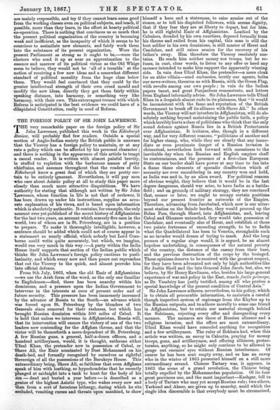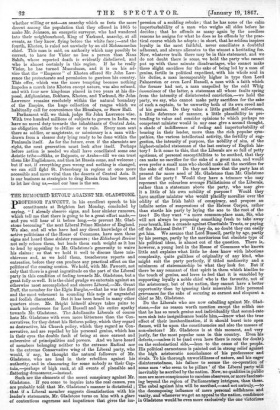'TUE FOREIGN POLICY OF SIR JOHN LAWRENCE.
THE very remarkable paper on the foreign policy of Sir John Lawrence, published this week in the Edinburgh Review, will probably find few readers. Outside a special section of Anglo-Indian society the British public is unaware that the Viceroy has a foreign policy to maintain, or at any rate a policy which can be affected by his personal character ; and there is nothing in the appearance of this article to tempt a casual reader. It is written with almost painful brevity, is stuffed to repletion with the barbarous names of petty chieftains, and assumes throughout that the readers of the Edinburgh know a great deal of which they are pretty cer- tain to be entirely ignorant. Nevertheless, it will pay men -who care about Asiatic policy at all to study this paper more closely than much more attractive disquisitions. We have authority for stating that although not written by Sir John 'Lawrence, whose function in life is not that of reviewer, it ha been drawn up under his instructions, supplies an accu- rate explanation of his views, and is based upon information which is absolutely authentic. It contains;for example, the only account ever yet published of the secret history of Affghanistan f orthe last two years, an account which scarcely five men in the -world, two of whom are in St. Petersburg, are in a position to prepare. To make it thoroughly intelligible, however, a sentence should be added which could not of course appear in a statement so nearly official, which nobody but Lord Oran- borne could write quite accurately, but which, we imagine, would run very much in this way :—A party within the India -House itself supports that section of the Indian public which 'thinks Sir John Lawrence's foreign policy cautious to pusil- lanimity, and which every now and then pours out reproaches that cut the Viceroy to the quick, and almost provoke him into official defence.
From 9th July, 1863, when the old Emir of Afghanistan —we use the Arab form of the word, as the only one familiar t o Englishmen—died, there has been anarchy within his dominions, and a pressure upon the Indian Government to intervene in the interests at once of present order and of lutrus security. This pressure has been immensely increased by the advance of Russia to the South—an advance which -was forced upon St. Petersburg by the blunders of two Generals since removed for their rashness, but which has -brought Russian dominion within 500 miles of Cabal. It is held that unless we intervene in Afghanistan, Russia will, that its intervention will ensure the victory of one of the two leaders now contending for the Affghan throne, and that the -victor will be thenceforth a mere dependent of St. Petersburg.
A few Russian guns, a general, half-a-dozen officers, and a hundred artillerymen, would, it is thought, enthrone either t fzul Khan, the pretender now in possession of Cabul, or 'Shore Ali, the Emir nominated by Post Mohammed on his death-bed, and formally recognized by ourselves as rightful Sovereign of all the possessions of the Barukzye House. This extraordinary being, Shere Ali, so faithless that even Afghans speak of him with loathing, so hypochondriac that he recently plunged at midnight into a tank to hunt for the body of his son — dead and buried a year before — is described as a genius of the highest Asiatic type, who wakes every now and then from a sort of ferocious lethargy, during which he sits secluded, vomiting curses and threats upon mankind, to show himself a hero and a statesman, to raise armies out of the stones, or to tell his dispirited followers, with serene dignity, that if they fear they are at liberty to depart, but for him, he is still rightful Emir of Afghanistan. Loathed by the Cabnlees, dreaded by his own courtiers, deposed formally from his throne and exiled from his capital, this man is still the best soldier in his own dominions, is still master of Herat and Candahar, and still raises armies for the recovery of his father's sway. Him therefore the Viceroy resolutely sus- tains. He sends him neither money nor troops, but he re- fuses, in curt, clear words, to listen to any offer or heed any menace intended to make him support the apparently winning side. In vain does Ufzul Khan, the pretender—a mere cloak for an abler villain—send embassies, terrify our agents, bribe our news-writers, threaten us with Russia, with the Green Flag, with revolts among our own people ; in vain do the Indian papers taunt, and great Prinjanbees remonstrate, and letters from England informally advise. Sir John Lawrence tells Ufzul Khan in a despatch almost rude in its plainness, that "it would be inconsistent with the fame and reputation of the British Government to break off its alliance with Shere Ali." In other words, the Viceroy will not interfere in Afghanistan, will do ab- solutely nothing beyond maintaining the public faith, a policy which terribly hurts a class of politicians who think that the only sound defence against Russia lies in a British Protectorate over Afghanistan. It irritates, also, though in a different way, and for very different reasons, "politicians of another and far higher stamp, who, while they see clearly that any imme- diate or even proximate danger of a Russion invasion is chimerical, nevertheless look forward with uneasiness to the inevitable day when the Russian and English empires shall be conterminous, and the presence of a first-class European State on our border shall have power at any time to fan into a flame those elements of sporadic disaffection which of necessity are ever smouldering in any country won and held, as India was and is, by an alien sword. For political reasons of obvious weight, they believe that it would be in the last degree dangerous, should war arise, to have India as a battle- field ; and on ground; of military strategy, they are convinced that, sooner or later, we ought to occupy certain positions beyond our present frontier as outworks of the Empire. Therefore, advancing from Jacobabad, which now is our utter- most station on the Scinde border, they would proceed up the Bolan Pass, through Shawl, into Afghanistan, and,_ leaving Cabul and Ghuznee untouched, they would take possession of Candahar, and eventually also of Herat, and establish at these two points fortresses of exceeding strength, to be to India what the Quadrilateral has been to Venetia, strongholds such as no invader would dream of trying to mask. And the long process of a regular siege would, it is argued, be an almost hopeless undertaking, in consequence of the natural poverty of the country, the distance of the enemy from their base, and the previous destruction of the crops by the besieged. These opinions deserve to be received with the greatest respect, for they have been advocated not only by high authorities like Sir Justin Shell and the late General John Jacob, but, also, we believe, by Sir Henry Rawlinson, who, besides his large general experience of war and policy in the East, stands facile princeps, as Dr. Vambery has justly testified, among all who profess a special knowledge of the present condition of Central Asia." Sir John Lawrence adheres, nevertheless, to his policy, which is to obtain all procurable information, to maintain a careful though imperfect system of espionage from the Khyber up to the Russian outposts, and to adhere morally to some one friend in Afghanistan, but to retain our material strength behind the Suleiman, rejecting every offer and disregarding every menace. The menaces are those of Russian alliance and a religious invasion, and the offers are most extraordinary. Ufzul Khan would have conceded anything for recognition and a few artillerymen. The ruler of Bokhara had, when this article was written, an envoy in Calcutta, praying for money troops, guns, and artillerymen, and offering alliances, protec- torates, anything, so he might only continue to be allowed to gouge out enemies' eyes without Russian interference. Of course he has been sent empty away, and so has an envoy who in the winter of 1865 presented himself on a still more extraordinary errand. Chinese Tartary was, it appears, in 1863 the scene of a grand revolution, the Chinese being totally expelled by the Mohammedan population. Of its four great provinces one, and the most important—Kashgar, fell to a body of Tartars who may yet accept Russian rule; two others, Yarkund and Aksoo, are given up to anarchy, amid which the single idea discernible is that everybody must be circumcised, -whether willing or not—an anarchy which so frets the more decent among the population that they offered in 1865 to make Mr. Johnson, an energetic surveyor, who had wandered into their neighbourhood, King of Yarkund, anarchy, at all events, as they know, flying before the white face ;—and the fourth, Khoten, is ruled not unwisely by an old Mohammedan chief. This man is said, on authority which may possibly be correct, to have for Vizier no less a person than Nana Sahib, whose reported death is evidently disbelieved, and who is almost certainly in this region. If he be really Vizier, he has turned Mussulman, and it is on his ad- vice that the "Emperor" of Khoten offered Sir John Law- rence the protectorate and permission to garrison his country. This offer, which was the more tempting because nothing impedes a march into Khoten except nature, was also refused, and with four new kingdoms placed in two years at his dis- posal, Affghanistan, Bokhara, Khoten, and Yarkund, Sir John Lawrence remains resolutely within the natural boundary of the Empire, the huge collection of ranges which we habitually call for convenience the Himalaya, or Snow Hall.
Parliament will, we think, judge Sir John Lawrence wise. With two hundred millions of subjects to govern in India, we have no moral duty towards the inhabitants of Central Asia, no obligation either to civilize or to rule. Every man sent there as soldier, or magistrate, or missionary is a man with- drawn from a clearer duty lying ready to be done within the Peninsula itself. As for the future, even if the alarmists are right, the next generation must look after itself. Perhaps before action is needed we shall have conciliated some one Asiatic tribe—Sikhs, or Rajpoots, or Arabs—till we can trust them like Englishmen, and then let Russia come, and welcome ; but if not, if everything goes wrong and nothing is changed, we can still fight St. Petersburg in regions at once more accessible and more vital than the deserts of Central Asia. It is our business as strategists to drag Russia from her base, not to let her drag us,—and our base is the sea.































 Previous page
Previous page